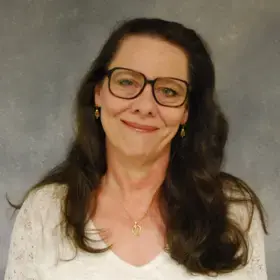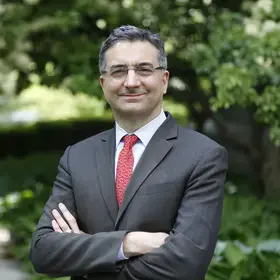A strange thing happened for Narrative Medicine Certificate of Professional Achievement students in the week that COVID-19 started to deeply change the American way of life. Even though students, the majority of whom are practicing clinicians in the prime of their careers, were technically on spring break, they found themselves yearning to return to their virtual learning communities for support.
“The class and our online community keeps me grounded. It takes me out of panic mode and into what I love: literature and other people,” one student wrote.
For Cindy Smalletz, the Narrative Medicine CPA Program Director, that meant one thing: the program needed to increase its offerings to keep students and clinicians connected, reflecting, and able to escape (if just for a little bit) the incredible new circumstances many students were now facing in the healthcare systems within which they worked.
“When this happened, it didn’t change our CPA program, which is already offered completely asynchronously online, but it changed everyone’s lives within the program,” Smalletz said. “Two-thirds of the people in the program work in healthcare, either as clinicians or supporting roles. I wrote an email telling everyone we’re continuing with our courses online, but we’re also being flexible, acknowledging the greater stress everyone is under. I got hundreds of replies from students and alums with heartbreaking stories. The interesting thing that came out of this is that people wanted to maintain their sense of community.”
For the uninitiated, Narrative Medicine is an interdisciplinary field that fosters in its practitioners powerful narrative skills, including radical listening, analysis, and the ability to harness creativity through the humanities and the arts as a means to illuminate and address the needs of all who seek and deliver healthcare. Narrative medicine enables patients and caregivers to voice their experience, to be heard, to be recognized, and to be valued, improving the delivery of healthcare. Columbia University School of Professional Studies administers both a Master’s in Narrative Medicine and Certificate of Professional Achievement, in concert with the Columbia University Irving Medical Center.
We caught up with Smalletz, who is also a graduate of the Narrative Medicine master’s program, to learn how the master’s and CPA programs are creating opportunities for all to benefit from the core tenets of narrative medicine:
Crafting More Opportunities for Social Connection
In order to connect students more deeply and offer clinicians more frequent opportunities for respite, Smalletz began working on programming on three fronts:
1. Creating an Additional “Social Connections CPA Course:”
Courses for the Narrative Medicine Certificate of Professional Achievement run for 10 weeks at a time. With the spring session wrapping up as the COVID-19 pandemic was ramping up, Smalletz is crafting a free, online course for CPA students to take between now and the summer session to help classmates stay connected and supported. Thirty-five students volunteered to help run the class.
I have been working in the Emergency Department, sometimes numb sometimes terrified sometimes hopeful and grateful. Tonight was the first deep breath I took in a while.
— Narrative Medicine Virtual Group Session Participant
2. Virtual Narrative Medicine Group Sessions:
Nearly every day for the past two weeks, leaders of the Narrative Medicine program have been offering Virtual Group sessions led by trained facilitators that feature the close-reading of text, a prompt for reflective writing, and the opportunity to share this writing. These sessions are open to the public and can hold up to 100 people. You can find out about upcoming sessions and read more about what discussions happened at previous sessions here.
“If we can provide relief, if we can provide community, that’s just the best feeling of being able to offer support,” Smalletz said.
“Narrative Medicine is not therapy, but it can be very therapeutic,” Smalletz says. “ It is not just reading a poem, writing, or a support group. It is a specific process that fosters deeper understanding of language and art, and lends itself well to being a moment of respite that connects with your life.
“That’s the magic of Narrative Medicine. You can read even a single word, multiple different ways. We ask: who is the narrator, what do you notice about the words that they chose to use? Readers then are able to conceptualize all these different perspectives, which is very empowering. It is a way to get deeper into the complexity of the text. Now, you’re out of COVID-19, you’re just focusing on the text. These mixed sessions are powerful because everyone is learning from everyone’s different viewpoint. These current events are impacting everyone right now in different ways, but here you can participate and are valued, and you have the opportunity to get what’s happening outside the session out of your head for a moment.”
The goal, Smalletz says, is “to get a little hope at the end. A recognition of the reality and a little hope.”
One student wrote:
"I have been working in the Emergency Department sometimes numb sometimes terrified sometimes hopeful and grateful. Tonight was the first deep breath I took in a while."
3. Naturally Occurring Work Group Sessions:
The Narrative Medicine program is also working on ramping up smaller, team-based facilitated sessions for groups that are working through this crisis together, such as those working in an Emergency Room.
If we can provide relief, if we can provide community, that’s just the best feeling of being able to offer support.
— Cindy Smalletz, Program Director, Narrative Medicine Certificate of Professional Achievement
Adopting Narrative Medicine Techniques For Your Life
Smalletz says thatreading, engaging with works of art, or writing can all be used as ways to escape the current realities of work, but that Narrative Medicine is a practice where these exercises are meant to be done in the presence of others.
“If you’re only reading through your own perspective, you only get so far,” Smalletz says. “That’s good -- poems, prompts, diaries, self-writing all have a place -- but Narrative Medicine is done with other people because one of its biggest dividends is seeing how many different ways there are to engage with a creative piece that go beyond the perceptions of just the author/creator and a single reader. The practice illustrates the complexity of art and our response to it. It is hard to replicate that in a virtual, isolated environment, but we’re trying to have our facilitators write about our Virtual Group sessions after they take place, providing a summary that helps illustrate what happens in these group spaces.
“You can practice reading, writing, and sharing with friends, your partner, and family, but when we do a session, we have a highly-experienced facilitator running it, and they are able to guide participants towards an awareness of how their group is interacting with whatever creative practice they choose, which is what expands the benefits of these practices.”
Smalletz also mentioned the Narrative Medicine Book Club, which is reading Albert Camus’ “The Plague,” and is open to public participation and nightly live-readings of relevant texts on Facebook, which all are welcome to tune into.
You need to ‘leave,’ you need to create, you need to imagine. For people that are stuck at home, or clinicians at work, the mind is whirring. [Narrative Medicine is a chance to slow down. It can be almost like a meditation.
— Cindy Smalletz, Program Director, Narrative Medicine Certificate of Professional Achievement
Decompress from Overwhelming Circumstances
The ultimate point of practicing Narrative Medicine during the COVID-19 pandemic is to help people feel “witnessed and counted,” Smalletz says. “We look at every person and they count, they matter.”
Reading fiction is incredibly important at times like these, as it offers both a chance to escape reality, and an example of how we can learn from and reshape the experience of reality in creative ways, providing a sense of agency when we feel helpless.
“You need to ‘leave,’ you need to create, you need to imagine,” Smalletz says. “For people that are stuck at home, or clinicians at work, the mind is whirring. This is a chance to slow down. It can be almost like a meditation. The effect is similar, but we provide different way to get to that effect.
“Narrative Medicine is the greatest equalizer. It doesn’t matter who you are, where you’re from, what your experience is--you’re bringing something to the session that counts. You’re acknowledging what you see and what other people see. That’s the growth that happens in this practice. Narrative Medicine is a great way to decompress and expand your perception of yourself, others, and the world.”
Learn more about the Narrative Medicine program here.


